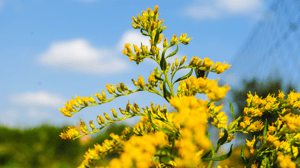As Earth Day approaches, there's no better time to reflect on our impact on the planet and how we can make a positive difference. At Garden for Wildlife, we believe that one of the best ways to contribute to a healthier planet is through eco-friendly and sustainable gardening practices.

Sustainable Gardening Tips
In this blog post, we'll share three tips for sustainable gardening with native plants, empowering you to make a positive difference for the planet. By incorporating native plants into your garden and adopting sustainable gardening techniques, you can create a beautiful outdoor space while also supporting biodiversity and conservation efforts. Earth Day can be every day!
Cultivate Native Plants
 Native plants are the backbone of a sustainable garden. These species have evolved to thrive in their local ecosystems, requiring minimal water, fertilizer, and pesticide inputs once established. By choosing native plants for your garden, you not only reduce your environmental footprint but also create a resilient landscape that supports local wildlife.
Native plants are the backbone of a sustainable garden. These species have evolved to thrive in their local ecosystems, requiring minimal water, fertilizer, and pesticide inputs once established. By choosing native plants for your garden, you not only reduce your environmental footprint but also create a resilient landscape that supports local wildlife.
When selecting native plants, prioritize species like keystone plants that are indigenous to your region and well-suited to your garden's growing conditions. From vibrant wildflowers to hardy shrubs and grasses, there's a diverse array of native species to choose from. By cultivating native plants, you'll not only beautify your garden but also provide essential food and habitat for pollinators, birds, and other wildlife.
Conserve Water Wisely
Water is a precious resource, and conserving it in the garden is paramount to sustainable gardening. Implementing water-wise practices not only reduces water consumption but also fosters healthier, more resilient plants. Here are some tips for conserving water in your garden:
- Install a rainwater harvesting system, such as a rain barrel, to capture and store rainwater for use in your garden.
- Mulch your garden beds with organic materials like compost, straw or wood chips to retain soil moisture and suppress weed growth.
- Choose drought-tolerant native plants that are adapted to your region's climate and require minimal watering once established.
By prioritizing water conservation in your garden, you'll not only save water but also create a more sustainable and resilient landscape.
Foster Habitat for Wildlife
A sustainable garden is more than just a collection of plants—it's a vibrant ecosystem that supports a diverse array of wildlife. By creating habitat features such as bird feeders, butterfly and pollinator gardens, and wildlife-friendly landscaping, you can attract and support local wildlife. Providing a water source for wildlife, especially during the warmer months, is a great way to enhance your wildlife garden.
Incorporate a variety of native plants into your garden to provide food, shelter, and nesting sites for birds, butterflies, and other wildlife. Choose plants with varying bloom times: spring-blooming plants for early pollinators, and native plants that thrive in fall for late season interest. By welcoming wildlife into your garden, you'll not only enhance biodiversity but also enjoy the beauty of nature up close.
BONUS TIP: Avoid using chemical pesticides and herbicides, as these can harm beneficial insects and disrupt the natural balance of your garden ecosystem. This is crucial for an organic sustainable garden.
This Earth Day, let's celebrate the beauty and resilience of our planet by embracing sustainable gardening practices. By cultivating native plants, conserving water wisely, and fostering habitat for wildlife, home gardeners can play a crucial role in promoting sustainability and protecting the planet for future generations.

Keystone Native Plants for Wildlife
Keystone plants are natives that support the 90% of butterflies, moths, and up to 60% native bees in a specific ecoregion.
